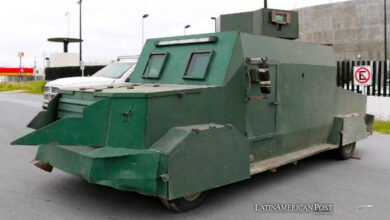Peru's recent congressional maneuvers expose the perils of a judiciary-legislature standoff.

Photo: LatinAmerican Post
Latin American Post Staff
Listen to this article
Leer en español: La ruptura política del Perú: un preludio al colapso institucional
Challenge to the Separation of Powers: The Conflict in Peru
In Peru, a striking drama is unfolding at the intersection of legislative authority and judicial oversight, where the president of the Congress, Alejandro Soto, postponed a plenary session that was set to debate the removal of members of the National Board of Justice (Junta Nacional de Justicia – JNJ). The legislative decision was slated despite a judicial ruling that temporarily suspended this process. This has ignited a firestorm of debate over the sanctity of separation of powers, a cornerstone of democratic governance, and highlighted the inherent dangers when these boundaries blur.
Traditionally the arbiter of constitutional boundaries, the judiciary has stepped in to assert its power, a move some congress members have decried as overreach. In Peru's fraught political landscape, this clash is not merely a procedural hiccup but a symptomatic expression of a deeper institutional malaise that threatens the country's democratic framework.
At the heart of this confrontation is the JNJ's pivotal role in appointing judges and prosecutors, a task imbued with the highest responsibility and potential for political influence. Therefore, the congressional effort to remove the JNJ's members is not just about the individuals involved; it's a battle over the control of the judiciary itself, a dangerous game that risks undermining public confidence in the impartiality and independence of the courts.
The alarm bells rang louder when Soto announced the appeal to the Attorney General's Office, simply indicating a refusal to consent to the judicial order. It's a power struggle that harkens back to darker times in Peruvian history, where institutional clashes often precipitated broader political crises.
Institutional Division: A Dangerous Omen
The fractiousness within Congress itself further complicates matters. The divide among legislators – some branding the judicial decision as "prevaricating" and others advocating respect for the judiciary – is emblematic of a more significant polarization within Peruvian politics. When those entrusted with legislative responsibilities openly flout judicial decisions, it undermines the rule of law and sets a precedent for institutional disobedience.
Vice President Rosselli Amuruz's statements on the now-defunct Twitter, branding the judicial decision as an impediment to justice, underscores a disturbing trend of political leaders undermining the judiciary's authority for perceived political gains. This disrespects the judiciary's role and emboldens similar dismissals of judicial oversight in the future, gradually eroding the separation of powers.
Parliamentarian Héctor Acuña's stance, emphasizing the duty to respect the Constitution and comply with judicial decisions, represents the voice of reason and constitutional fidelity that seems to be in short supply. His approach is a reminder that political expediency should never trump constitutional mandates.
The internal division is a microcosm of the wider societal splits regarding Peru's institutional integrity. On the eve of the vote, the Superior Court of Justice's decision to temporarily suspend Congress's proceedings against the JNJ in response to a precautionary measure requested by the autonomous body was a significant assertion of judicial authority. Yet the Parliament's Board of Spokespersons' subsequent decision to continue with the session illustrates a blatant disregard for judicial authority.
Judicial Independence in Danger
The absence of JNJ magistrates from Congress, heeding the Superior Court's decision, reflects respect for the rule of law and a recognition of the potential consequences of judicial disobedience. As Omar Cairo, a lawyer for JNJ judge Inés Tello, expressed to RPP Noticias, their possible removal would not only be an act of defiance against the court. Still, it could set a precedent for future judicial disobedience, undermining the very foundations of judicial independence.
What's at stake in Peru is not just the fate of a few magistrates or the machinations of political maneuvering; it's the strength and integrity of democratic institutions. When branches of government clash with such intensity, the very fabric of democracy is strained, sometimes to the point of tearing. This is not an isolated incident but a warning sign, a forerunner of potential democratic backsliding that could have repercussions far beyond Congress's borders or the judiciary's chambers.
Also read: Crisis In Peru: Dina Boluarte More Similar To Duque And Piñera Than Castillo
The JNJ controversy may seem like an arcane dispute, but it's a potent symbol of the precariousness of Peru's democratic institutions. If the separation of powers is not respected, and if one branch of government can unilaterally impose its will on another, democratic governance is fundamentally compromised.
Peru's present political impasse serves as a cautionary tale. It's a vivid reminder that respect for institutional boundaries is not merely a legalistic concern but the bedrock of democratic stability. Without it, the path to authoritarianism becomes disturbingly navigable.





